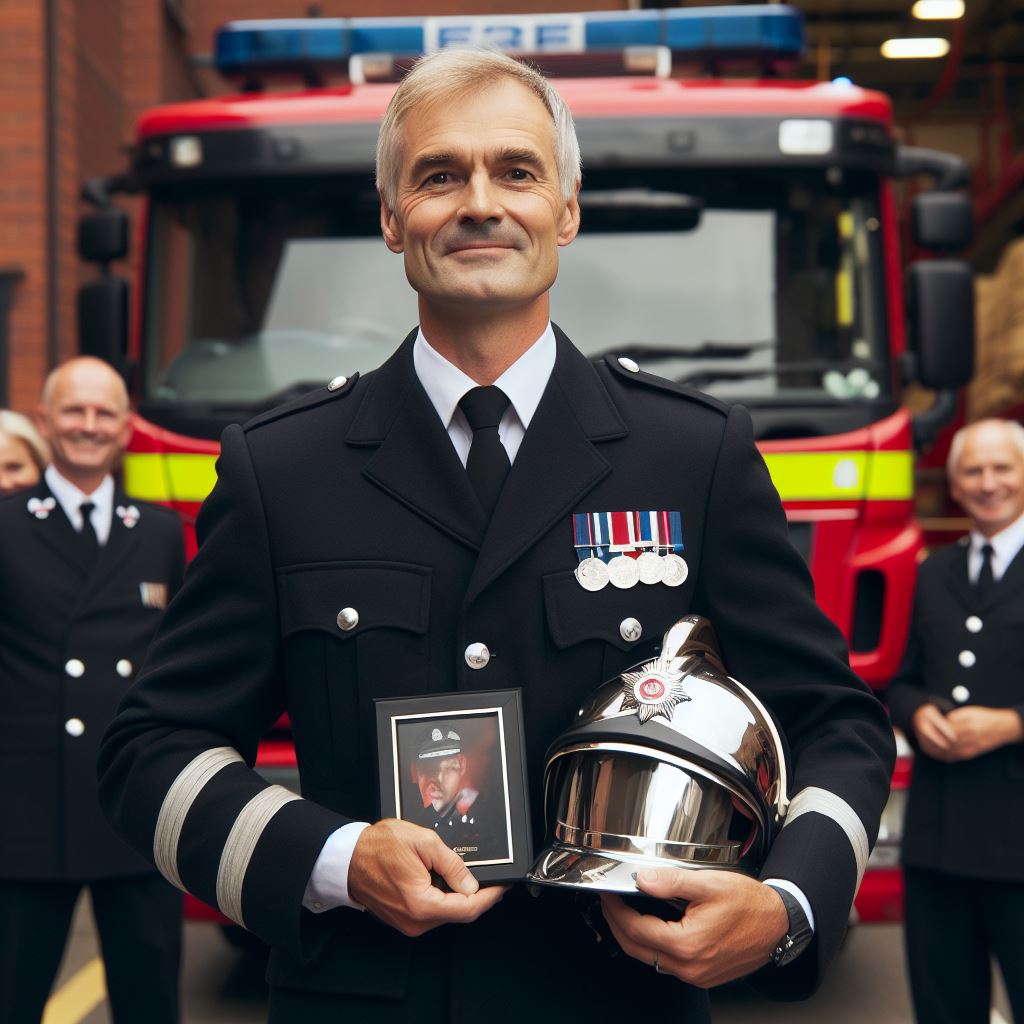Introduction
Retirement for firefighters in the United Kingdom is an important topic to discuss, as it affects the lives of those who have dedicated themselves to protecting others.
Firefighting is a noble profession that involves saving lives, protecting property, and ensuring public safety.
Firefighters face various challenges and risks every day, often working in dangerous and unpredictable situations to fulfill their duties.
The demanding nature of their job takes a toll on their physical and mental well-being.
Therefore, understanding the retirement system for firefighters is crucial to ensure they receive the support and care they deserve after a long and dedicated career.
UK firefighters undergo rigorous training to acquire the necessary skills and knowledge for efficient emergency response.
Firefighter retirement isn’t just an end but a transition to enjoy the fruits, spend time with loved ones, and pursue interests.
The retirement benefits and provisions for firefighters ensure financial stability and access to healthcare services, recognizing the sacrifices they have made to protect society.
This post explores the retirement system for UK firefighters, covering various aspects and the support provided during their golden years.
Retirement Age and Benefits for Firefighters
The current retirement age for firefighters in the United Kingdom
In the United Kingdom, the retirement age for firefighters is set at 55 years old.
In the United Kingdom, firefighters face a dynamic retirement age, often aligning with national pension adjustments.
Understanding these changes ensures retirees maximize available benefits, providing financial security in post-service life.
As firefighters transition, tailored pension benefits, reflective of service years and contributions, become accessible.
The evolving landscape of retirement age and benefits demands continuous awareness, allowing retirees to navigate this crucial phase confidently.
Beyond a professional exit, retirement offers an opportunity to savor rewards, spend quality time with loved ones, and pursue personal passions.
Personalized UK Career Consulting
Receive tailored career guidance designed just for you. Get actionable steps and expert support to boost your career in 1-3 days. Take control of your career now.
Get StartedBy comprehending pension schemes, firefighters chart a course for financial stability, facilitating a fulfilling retirement journey.
In summary, the retirement age for UK firefighters is not static; it’s an evolving aspect requiring attention and understanding for a seamless transition into post-service life.
Pension benefits and schemes available for retired firefighters
Retired firefighters are eligible for pension benefits under various schemes.
- The Firefighters’ Pension Scheme (FPS) is a defined benefit scheme available to all firefighters.
- Members of the FPS can receive a pension based on their final salary and length of service.
- For firefighters who joined the service on or after April 6, 2006, a new scheme called the New Firefighters’ Pension Scheme (NFPS) is in place.
- The NFPS is a career-average scheme, where pension benefits are based on average earnings over a firefighter’s career.
Recent changes or updates to retirement age or benefits
There have been recent changes to the retirement age and pension benefits for firefighters in the UK.
One significant change is the introduction of the 2015 Firefighters’ Pension Scheme (FPS 2015).
- Under the FPS 2015, the normal pension age was increased from 55 to 60 for firefighters.
- However, those aged 48 and above on April 1, 2012, were protected with a transitional arrangement.
In 2014, the Firefighters’ Pension Scheme (FPS 2006) was closed to new members.
Instead, new entrants joined the FPS 2015 or an alternative scheme known as the FPS 2015 Career Transition Scheme (CTS).
- The CTS offers a pension age of 55 but with reduced pension benefits.
- It aims to provide a fair deal to firefighters who are unable to work until the retirement age of 60.
The changes to retirement age and benefits are part of ongoing reforms to public sector pensions in the UK.
The aim is to make pensions more sustainable and affordable in light of increasing life expectancy and changing demographics.
These reforms have generated mixed opinions among firefighters and their representative organizations.
- Some argue that the increase in retirement age is unfair and puts older firefighters at risk.
- Others believe that the changes are necessary to ensure the long-term viability of pension schemes.
Overall, the retirement age for firefighters in the UK is set at 55, but changes have been implemented to increase it to 60 under certain circumstances.
Multiple pension schemes are available to provide retirement benefits based on either final salary or career-average earnings.
The introduction of the FPS 2015 and the closure of the FPS 2006 have brought significant changes to the pension landscape for firefighters.
These changes aim to address the challenges faced by public sector pensions and ensure their sustainability in the future.
Your Dream Job Starts with a Perfect CV
Get a tailored CV and cover letter that captures your unique strengths and stands out in your industry. Let us help you make an unforgettable first impression.
Get StartedRead: Famous Fires in UK History and Lessons Learned
Factors Affecting Retirement for Firefighters
Throughout their careers, firefighters face numerous physical demands and challenges that can significantly impact their ability to work until the standard retirement age.
1. Physical demands and challenges faced by firefighters throughout their careers
- Exposure to extreme heat, smoke, and hazardous materials puts immense strain on firefighters’ bodies.
- They frequently engage in physically demanding tasks such as carrying heavy equipment, climbing ladders, and rescuing individuals.
- The nature of their work requires them to work in high-pressure situations, often for prolonged periods.
- Firefighters frequently face mentally and emotionally challenging situations, which can take a toll on their overall well-being.
- They must maintain a high level of fitness and undergo continuous training to effectively perform their duties.
2. Impact on Their Ability to Work Until the Standard Retirement Age
The physical demands and challenges in firefighters’ careers can impact their ability to work until the standard retirement age.
- Repeated exposure to hazardous conditions and physical exertion can lead to serious injuries or chronic health issues.
- Firefighters may experience musculoskeletal problems, respiratory illnesses, or cardiovascular issues due to the nature of their work.
- The rigorous nature of firefighting can lead to cumulative trauma disorders, limiting their physical capabilities over time.
- Psychological stressors, such as witnessing traumatic events, can contribute to mental health struggles and impact their ability to perform effectively.
- These factors may force firefighters to retire early or transition to less physically strenuous roles within the fire service.
3. Effects of Firefighting on Firefighters’ Health and Overall Well-being
The demanding nature of firefighting can have significant effects on firefighters’ health and overall well-being, potentially affecting their retirement options.
- Physical injuries sustained during their careers can result in long-term disabilities, limiting their ability to continue working.
- Exposure to smoke and hazardous substances may lead to respiratory diseases, including asthma or lung cancer.
- High stress levels and traumatic experiences can contribute to mental health disorders, including post-traumatic stress disorder (PTSD).
- Shift work and irregular schedules can disrupt sleep patterns, negatively impacting physical and mental health.
- The unique demands of a firefighter’s lifestyle can strain personal relationships and contribute to emotional and social challenges.
Overall, the physical demands, challenges, and potential health effects of firefighting can significantly impact firefighters’ ability to work until the standard retirement age.
Fire and rescue services must prioritize the well-being of their personnel, ensuring proper support systems are in place throughout their careers.
Read: Firefighting Tech: Innovations in the UK
Options for Early Retirement
Possibilities of early retirement for firefighters in the United Kingdom
When it comes to early retirement for firefighters in the United Kingdom, there are several options and programs to consider.
Here, we will examine the possibilities, discuss special provisions, and highlight the criteria and requirements for early retirement in this field.
1. Pension Schemes
Firefighters in the United Kingdom have access to pension schemes that allow for early retirement.
These schemes provide financial security and support for firefighters who choose to retire before the standard retirement age.
Under these pension schemes, firefighters can receive a reduced pension if they retire early.
The amount of the reduction is determined based on the number of years the firefighter retires before the normal retirement age.
It is important for firefighters to carefully consider the financial implications of early retirement and consult with financial advisors to understand the impact on their pension income.
Optimize Your LinkedIn for Success
Boost your LinkedIn profile with a professional bio, keyword-rich headline, and strategic recommendations that attract recruiters. Stand out from the crowd and get noticed.
Optimize Now2. Special provisions or programs that may be available for firefighters to retire early
Firefighters face unique challenges and risks in their line of work, which is why there are special provisions and programs available to support early retirement for them.
The Ill-Health Retirement Scheme permits firefighters to retire early if they are permanently disabled or unable to perform duties due to illness or injury.
This scheme ensures that firefighters receive appropriate support in such unfortunate circumstances.
In addition, there may be provisions for firefighters who have served a certain number of years to retire early with reduced benefits.
These provisions are designed to acknowledge the physical and mental demands of firefighting and offer firefighters an opportunity to transition into retirement.
3. Criteria and Requirements for Early Retirement
In order to qualify for early retirement as a firefighter in the United Kingdom, certain criteria and requirements must be met.
The exact criteria may vary depending on the specific pension scheme and provisions in place.
However, common requirements for early retirement often include:
- Minimum years of service: Firefighters may be required to have a certain number of years of service before being eligible for early retirement.
- Age requirements: Some pension schemes may have age restrictions or minimum age requirements for early retirement.
- Medical assessments: Firefighters may need to undergo medical assessments to determine their fitness for duty and eligibility for early retirement due to ill health or disability.
- Financial considerations: Early retirement may involve reductions in pension benefits, and firefighters need to consider the financial implications before making a decision.
Firefighters must familiarize themselves with their pension schemes or relevant authorities’ requirements and criteria for a smooth transition into early retirement.
In essence, early retirement for firefighters in the United Kingdom is possible through pension schemes, special provisions, and programs.
By understanding the available options, firefighters can make informed decisions about their retirement and enjoy the financial security they deserve after their dedicated service.
Read: Volunteer Firefighting in the UK: A Guide

Transitioning to Retirement: Challenges and Opportunities
Retirement is a significant milestone in a firefighter’s life, marking the end of a dedicated career.
However, transitioning from an active firefighter to a retiree can present its own set of challenges.
It is crucial to navigate this phase effectively and embrace the opportunities that come with it.
Challenges in Transitioning to Retirement
- Loss of Identity: For many retired firefighters, their profession defines their identity, and leaving the firefighting community can lead to a loss of purpose.
- Social Isolation: The camaraderie fostered within the fire service may abruptly vanish upon retirement, leaving retirees feeling disconnected and isolated.
- Adjusting to a New Routine: Retired firefighters must establish a new daily routine, as their structured schedule and adrenaline-filled shifts no longer exist.
- Financial Considerations: Planning for retirement, managing pensions, and adapting to a potentially reduced income can be challenging for retired firefighters.
- Health and Well-being: The physical demands of firefighting can leave retirees with lingering health issues that require attention and adjustment.
Navigating the Transition Effectively
- Seek Support: Reach out to fellow retirees and fire service support networks to share experiences and gain advice.
- Create New Goals: Set personal and professional goals to maintain a sense of purpose and fulfillment throughout retirement.
- Stay Active and Engaged: Explore physical activities, volunteer opportunities, or part-time work to stay active and connected.
- Take Care of Your Health: Prioritize regular medical check-ups, maintain a healthy lifestyle, and seek support for any physical or mental health concerns.
- Financial Planning: Consult a financial advisor to ensure a secure retirement and make informed decisions regarding pensions and investments.
Opportunities for Retired Firefighters
- Mentorship: Retired firefighters can utilize their experience by mentoring and supporting current firefighters, offering valuable guidance.
- Teaching and Training: Becoming instructors or trainers can help retired firefighters share their knowledge and skills with aspiring firefighters.
- Advocacy and Consulting: Get involved in organizations focused on firefighter welfare and safety, lending expertise and advocating for positive change.
- Volunteering: Engaging in community service or volunteering with organizations can provide a sense of purpose and contribute to society.
- Alternative Careers: Many retired firefighters successfully transition into related fields such as emergency management, safety consulting, or firefighting equipment sales.
Retirement may mark the end of one chapter, but it opens doors to new opportunities and personal growth.
Retired firefighters, by recognizing challenges and embracing a proactive mindset, can maximize their transition, sustaining a positive impact in the firefighting community.
Financial Planning and Resources for Retirement
Tips and advice on financial planning for firefighters nearing retirement
When it comes to retirement, financial planning plays a crucial role for firefighters in the United Kingdom. Here are some valuable tips and advice to consider:
1. Start Saving Early
One of the most important steps for firefighters nearing retirement is to start saving as early as possible.
The earlier you begin, the more time your money has to grow.
2. Take Advantage of Investments
Explore investment opportunities that can enhance your financial security during retirement. Consult with a financial advisor to determine the best options for your specific needs.
3. Understand Firefighters’ Pensions
As a firefighter, it is essential to fully comprehend the details and benefits associated with your pension plan.
Be aware of any specific considerations or provisions that may affect your retirement income.
4. Seek Financial Advice
Consider consulting with a financial advisor who specializes in retirement planning for firefighters.
They can provide tailored advice based on your unique circumstances and help maximize your retirement savings.
5. Budget Wisely
Create a budget that reflects your anticipated retirement lifestyle.
Account for expenses such as healthcare, housing, and leisure activities, ensuring your savings align with your retirement goals.
6. Minimize Debts
Reducing your debts before retirement can significantly improve your financial situation.
Prioritize paying off high-interest debts to decrease financial burdens during your retirement years.
7. Explore Additional Income Sources
Consider generating additional income during retirement, such as part-time employment or pursuing a hobby that can generate revenue.
This can help supplement your retirement savings.
8. Utilize Retirement Resources
Take advantage of resources specifically designed for retired firefighters.
Organizations such as the Fire Fighters Charity offer financial guidance, support, and resources for managing post-retirement finances.
9. Educate Yourself About Tax Planning
Understand the tax implications of your pension and other retirement income sources.
Stay informed about tax-efficient strategies to optimize your retirement income and minimize financial obligations.
10. Plan for Healthcare Costs
Factor in potential healthcare expenses when creating your retirement plan.
Research healthcare options and consider private health insurance to ensure comprehensive coverage during your retirement years.
11. Consider Long-Term Care Insurance
Explore long-term care insurance options to safeguard against unexpected medical expenses that may arise later in life.
This can provide financial security and peace of mind for you and your loved ones.
12. Regularly Review and Adjust Your Plan
- Retirement planning is an ongoing process.
- Regularly review your financial plan and make adjustments as needed to ensure you remain on track for a comfortable retirement.
Basically, careful financial planning is crucial for firefighters approaching retirement in the United Kingdom.
By saving early, making wise investments, and seeking guidance from professionals, you can secure a financially stable future.
Utilize resources and organizations dedicated to supporting retired firefighters and regularly evaluate and adapt your plan to achieve a fulfilling retirement experience.
Success Stories and Personal Experiences
Retirement for firefighters in the United Kingdom is a significant milestone in their lives.
Let’s explore some success stories and personal experiences of retired firefighters that shed light on the joys and challenges of post-career life.
1. A Life Fulfilled
John, a retired firefighter with 30 years of service, shares his journey.
He reminisces about the exhilarating moments of saving lives, the camaraderie with fellow firefighters, and the sense of purpose his job provided.
After retirement, he found solace in pursuing his passion for painting. John’s story emphasizes that a fulfilling retirement is possible by following one’s dreams.
2. Coping with Emotional Transition
Margaret, a retired firefighter, talks about the emotional challenges she encountered after leaving the profession.
She struggled with the transition from the adrenaline-filled life of a firefighter to a quieter retirement.
However, through therapy and support groups, Margaret reconnected with her identity beyond her job title and found contentment.
Her story highlights the importance of seeking emotional support during the retirement process.
3. Building Lifelong Friendships
Dave, a retired firefighter, shares his experiences of building lifelong friendships within the firefighting community.
He describes the strong bond formed through shared experiences and the support system that remains even after retirement.
Dave’s story showcases the enduring relationships that bring joy and comfort during the retirement years.
4. Rediscovering Passions
Jane, a retired firefighter, recounts her journey of rediscovering passions outside of her career.
Initially struggling to fill the void left by retirement, Jane started volunteering at a local animal shelter.
Through this experience, she found a new purpose in helping animals and discovered a fulfilling retirement path.
Jane’s story inspires others to explore their passions and find meaning beyond their professional lives.
5. Lessons Learned
Retired firefighters often impart valuable lessons gained from their careers and retirement experiences. One recurring insight is the importance of mental and physical well-being.
Many retirees emphasize the need to prioritize self-care by maintaining a healthy lifestyle and staying active.
They also stress the significance of financial planning to ensure a comfortable retirement.
These lessons remind future retirees of the critical aspects to consider for a successful transition.
6. Embracing Change
- Retired firefighters frequently highlight the need to adapt and embrace change during retirement.
- They recognize that shifting from a structured work routine to a more flexible lifestyle requires adjustment.
- By embracing new opportunities, learning new skills, and exploring different interests, retirees can thrive in their post-firefighting lives.
- Their insights encourage others to welcome change and make the most of retirement.
7. Giving Back to the Community
- Many retired firefighters find fulfillment in giving back to their communities.
- Through volunteering, mentoring young firefighters, or organizing charity events, they contribute to society in different ways.
- These stories emphasize the importance of continued engagement and a sense of purpose even after retirement.
Success stories and personal experiences provide valuable lessons and insights for both current and future firefighters approaching retirement.
They highlight the joys, challenges, and various strategies to navigate this significant life transition successfully.
UK firefighter retirement offers a rewarding phase for exploring new passions, maintaining friendships, and making a positive impact on the community.
Read: The Future of Firefighting in the United Kingdom
Explore Further: Diplomatic Protocol & Etiquette: A UK Perspective
Find Out More: UK Civil Service: Career Progression
Conclusion
In this blog post, we have explored the topic of retirement for firefighters in the United Kingdom.
We have discussed the challenges faced by retired firefighters and the importance of preparing for retirement.
Retirement is a significant milestone in a firefighter’s life, as it marks the end of a career dedicated to serving and protecting communities.
It is a time for firefighters to reflect on their achievements, but also to plan for their future.
We have highlighted the physical and mental health implications that retirement can have on firefighters, emphasizing the need for adequate support systems and resources.
Retirement can bring about a change in identity and routine, and it is vital for firefighters to have access to counseling and programs that can assist in this transition.
Additionally, financial planning is crucial for firefighters to ensure a comfortable retirement.
We have touched upon pension schemes and early retirement options available to firefighters, encouraging them to take advantage of these opportunities.
Retirement for firefighters in the United Kingdom should not be overlooked or taken for granted.
These brave individuals have dedicated their lives to protecting others, and it is only fair that they receive the support they need during their retirement years.
We invite our readers to leave comments and share their own stories and thoughts on the topic of retirement for firefighters.
Together, we can create a platform for discussion and support for firefighters approaching or already in retirement.
Let us foster a community that recognizes and values the contributions of firefighters, even after they hang up their helmets.
[E-Book for Sale]
500 Cutting-Edge Tech Startup Ideas for 2024 & 2025: Innovate, Create, Dominate
$19.99 • 500 Tech Startup Ideas • 62 pages
You will get inspired with 500 innovative tech startup ideas for 2024 and 2025, complete with concise descriptions to help you kickstart your entrepreneurial journey in AI, Blockchain, IoT, Fintech, and AR/VR.




